January 2016
CEPP, the Centre for Educational Policies and Practices, is a Nepali NGO dedicated to improving education in state schools in rural areas. Near cities in Nepal, parents increasingly send their children private schools, that are often expensive. This evolution is also visible in the countryside. Parents have lost confidence in government schools. These government schools offer free education, but at the same time they face several problems: teachers are often absent, children go to school only if their work on the field can be missed, the quality of the education offered is too low . However, the government invests in these schools and education could be improved with a number of 'cheap' measures. To this end, the efforts of all concerned: parents, teachers, the local community, the children ... are required. CEPP is active in this area. CEPP wants to appreciate teachers, motivate them, raise awareness amongst parents about the importance of education, improve the quality of education and make child-oriented education a reality. At the same time, the organization also wants to influence the education policy throughout Nepal. The photographic report 'Schooling in the Monsoon' was sent to us by CEPP. The photographs were made by initiator Teeka Bhattarai and by other CEPP staff. The captions with the pictures have been written together with Teeka.
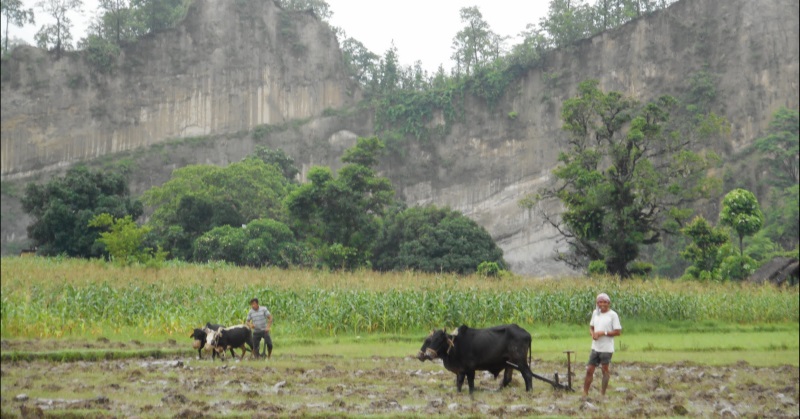
The Bagmati River near Raigaon (Makwanpur) and Pipalmadi (Sindhuli) Why complain? These girls are used to crossing the river to go to school. During the moesson, however, the river swells strongly and makes the crossing difficult.
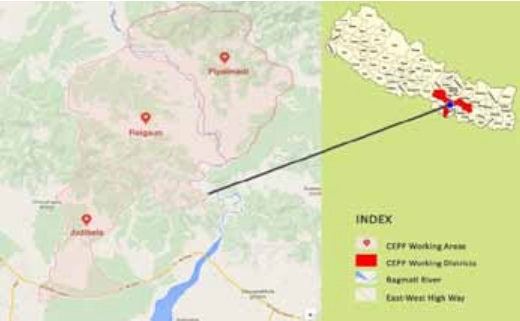 The work area of CEPP, the Centre for Educational Policies and Practices
The work area of CEPP, the Centre for Educational Policies and Practices
CEPP is active in 33 schools in the triangle formed by the Sindhuli, Makwanpur and Rautahat districts (SiMaRa), in the Inner Terai, the border region between the lowlands and the Middle Hills. The area is located south of Kathmandu and north of the East-West Highway, the traffic axis in southern Nepal. It is crossed by the Bagmati River and its tributaries, but is remote and left behind. The children in the schools belong to the ethnic minorities Rai, Tamang and Pahari.
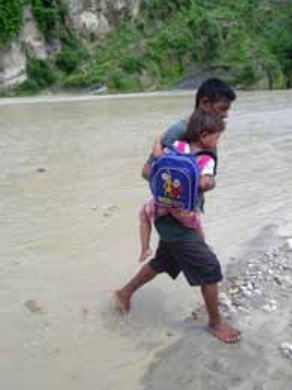 DThe smallest children cannot cross the river alone Their mother or father or someone from the school brings them to school or takes them home
DThe smallest children cannot cross the river alone Their mother or father or someone from the school brings them to school or takes them home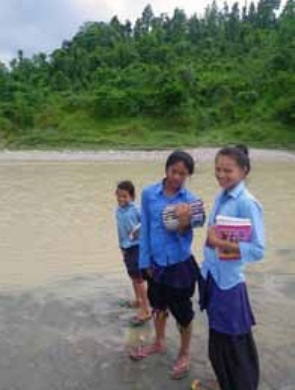 School bag?
School bag?Not everybody has a school bag. Often parents provide a bag when they send a child to a paying private school. The high number of girls in the free state schools is sometimes attributed to the fact that their brothers often go to a private school! Girls in Nepal have a harder time than boys, not just in education. CEPP therefore also works for women's emancipation.
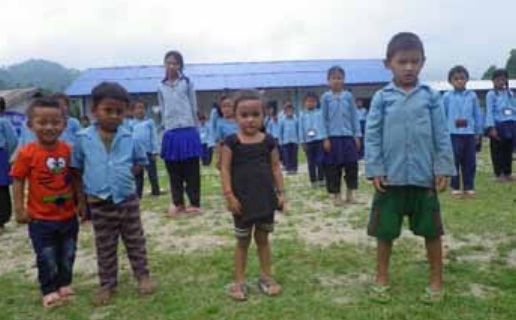 Children enjoy coming to school
Children enjoy coming to schoolThe little ones want to meet with their friends or their brothers and sisters. School life is different from life at home, and they like to learn. Children in government schools in Nepal rarely have a "lunch package". As a result, they are tired and weak in the afternoon and unable to study the subject matter. CEPP encourages parents to give them some food so the teachers can offer them "food for the mind".
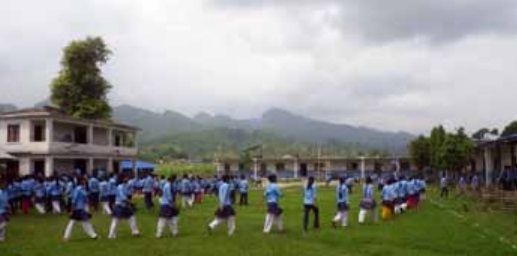 Bagmati Higher Secondary School, Raigaon
Bagmati Higher Secondary School, RaigaonThe Nepalese school uniform has been adapted in this government school: under the light blue shirt and the dark blue skirt, the girls wear long pants. The uniform is closer to their normal clothes, giving them more freedom of movement. Nepalese school children come together in the school area in the morning, sing the national anthem and get physical exercises (‘school drill’). Only then will they go to the classes.
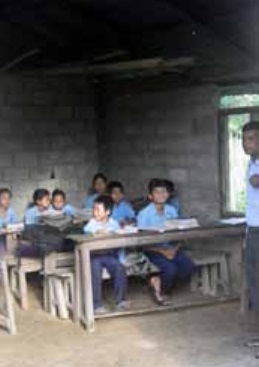 An ordinary classroom
An ordinary classroomClassrooms in the countryside are often little child-oriented: the floor is dusty, there are no educational materials, there is little light, in the monsoon the children can hardly hear the teacher because the rain taps against the metal roof ...
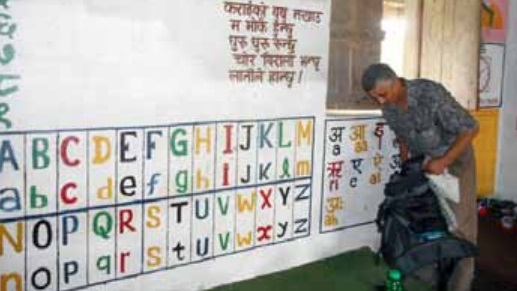 A 'model class'
A 'model class'In each of the schools of their working area field of work, CEPP provides a 'model class', arranged with the teachers' cooperation, and with the help of Nepalese and foreign volunteers with experience in education, and of trainees from Flemish schools. Floor coverings are provided so that children from the lower classes can put pillows on the floor and no longer inhale dust. The walls are decorated. During their work visits, members of the CEPP team stay in these classrooms.
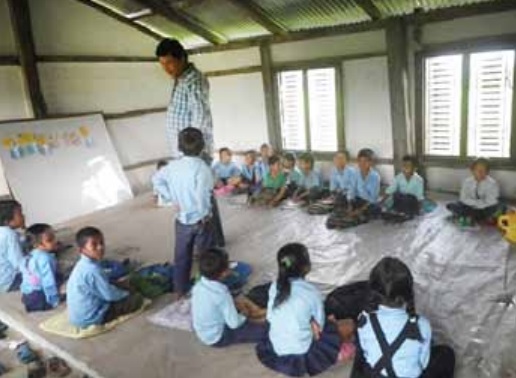 Quality education
Quality educationThe quality of the lessons is also improving. The main teaching technique in Nepalese schools is called "rote teaching": the teacher tells the students to repeat what he / she says. Children learn English by copying the textbook ... without understanding or reading the text ... In this class, the teacher uses some materials to teach English.
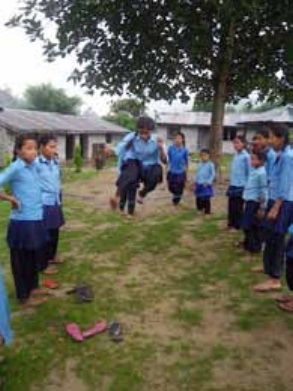 Rope skipping
Rope skipping There is little room for play in Nepalese government schools. CEPP encourages play. Experience shows that children are better at paying attention in class if they are allowed to play during breaks.
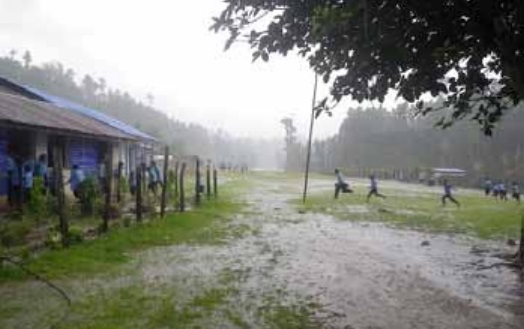 Running in the rain...
Running in the rain... When a violent shower starts, the children run to the classroom.
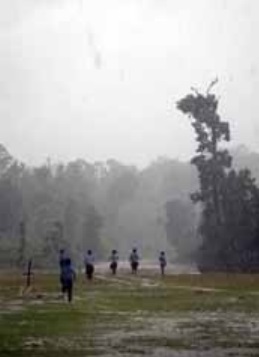 If the rain gets too heavy ...
If the rain gets too heavy ... the children rush back home, even if it's only noon. If they wait longer, they will not be able to cross the river anymore. A teacher accompanies them to assess whether the crossing is safe. Only towards the evening will the rain be less severe. Then the river is lower again.
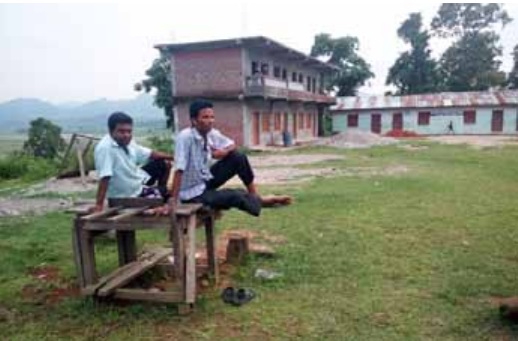 Relaxing in the coolness of the evening
Relaxing in the coolness of the evening The teachers in this area often come from the Terai, the lowland in the south. They cannot go home at night, it's too far. Often they say 'There’s nothing to do' and they're bored. Preparing classes is a challenge in most schools. CEPP is committed to motivating these teachers and appreciating their efforts.
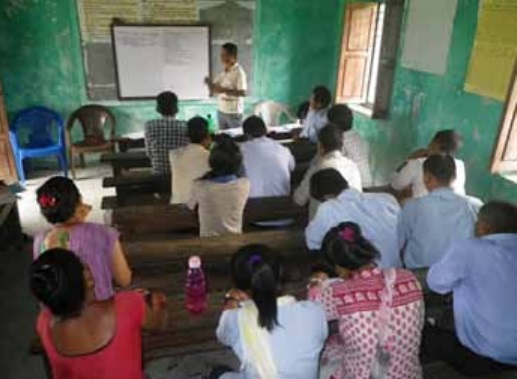 Teaching teachers
Teaching teachers A retired teacher, initiator of a local NGO with whom CEPP works closely together, supports a school to write the government-compliant School Improvement Plan (SIP, School Improvement Plan). In practice, many schools copy the 'plans' of other schools, due to lack of skills or interest. In this example, teachers get training on "how to gain the trust of the parents."
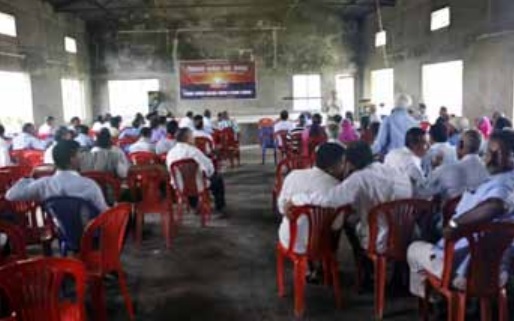 More training still…
More training still… On June 25, CEPP organised a training day for teachers, in collaboration with 'Teachers Can Make a Difference'. On this day, good practices are shown, valuable examples from schools in the same area or from a nearby school district. The films are discussed, teachers ask questions to the panel and discuss. CEPP wants to work not only at local level but also seeks cooperation with other organisations and wants to influence education policy. 'Teachers Can Make a Difference' is a joint effort by the Ministry of Education, the District Education Office (in this case Rautahat), CEPP, and the coordinating Suryodaya Education Foundation.
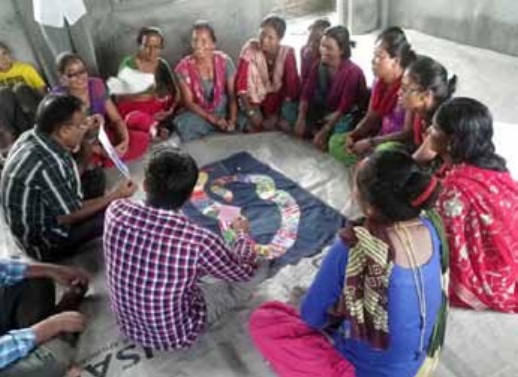 Formation for the parents
Formation for the parents CEPP staff give formation to the Mother Groups about the role of the SMCs. The SMCs are School Management Committees, a kind of extensive parent committees. Not only the parents are part of it, but also teachers and heads of local schools. CEPP attaches great importance to the role of the parents, and to the organisation and strengthening of the Mother Groups. Mothers have a significant influence on improving education.
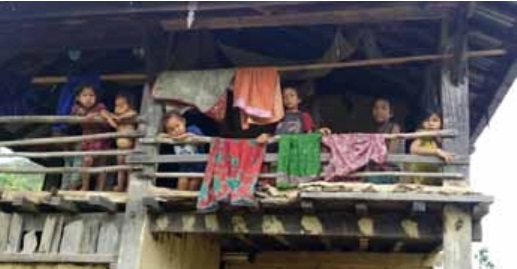 Will they come to school tomorrow?
Will they come to school tomorrow? Some children do not go to school: their parents need them at home. If they do not help on the field, their family loses too much income. Education is not adapted to the needs of the people. Schools should take into account the local circumstances in order to provide these children with education. Money and infrastructure alone cannot solve Nepal's educational problems.
CEPP’s motto is ‘Education is a Light’.
That slogan becomes reality for the schools in this area if the parents are aware of the importance of education, if the teachers are enthusiastic and if the policy makers are aware of the reality of the countryside.
You can help this project grow by making a contribution to Bikas BE32 2200 7878 0002 with the mention "Friends of Paul and Carine". Thank you! Paul Beké en Carine Verleye

